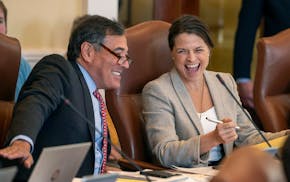Gov. Mark Dayton on Thursday proposed initiatives to enhance railroad safety on the same day that rail workers protested Canadian Pacific's safety practices by picketing its U.S. headquarters in Minneapolis.
The governor announced through his press secretary that he will urge legislative leaders to hold hearings on the United Transportation Union's reports of deteriorating safety conditions at Canadian Pacific — allegations the company flatly denied.
Dayton coincidentally met Thursday with a cabinet-level panel he formed in response to recent oil train disasters. The governor's press secretary, Matt Swenson, said Dayton just became aware of the union's safety concerns, which focus mostly on intensified operations at Twin Cities rail yards.
"He wants the cabinet members to look into these concerns," Swenson told the Star Tribune in an interview.
Swenson also said the Dayton administration is working on proposed rail safety legislation to present in the upcoming session. It could include expanding the number of state rail inspectors — Minnesota currently has just one — and additional emergency management training, he said.
Those proposals grew out of concerns over accidents like the deadly crash of an oil train on a short-line railroad in Quebec last July and the derailment and explosion of a BNSF Railway Co. oil train Dec. 30 a mile west of Casselton, N.D.
As the late-morning temperature hovered around zero, about 35 members of the United Transportation Union (UTU), which represents conductors, switchmen, yard masters and engineers, marched around the U.S. headquarters of Canadian Pacific in downtown Minneapolis carrying signs that said "Railroad Safety = Public Security!"
UTU State Director Phillip Qualy said the Canadian Pacific has offered "no effective response" to the safety concerns. The union has sent letters detailing its issues to public officials and railroad executives.
New management
The letters, including one to Dayton, allege that cost-cutting has contributed to safety deterioration under Canadian Pacific CEO E. Hunter Harrison. He was brought in a year ago to restructure after activist investor William Ackman became the railroad's largest investor. The railroad recently reported its fourth-quarter profit rose more than fivefold as it cut jobs and consolidated rail yards.
Oil trains are part of the railroads' success story, with U.S. crude-by-rail traffic up 40-fold in five years, and more growth projected. But recent disasters involving oil trains have brought calls by congressmen and senators in Minnesota, North Dakota and elsewhere for congressional hearings and enhanced government oversight. Federal regulators are considering requiring rail tank cars to be retrofitted with puncture-protection and other safety features, and the National Transportation Safety Board has called for rerouting hazardous trains away from populated areas.
Swenson said Dayton also plans to contact railroad executives about safety concerns.
Many of the union's safety issues focus on yard operations, including Canadian Pacific operations in St. Paul. The complaints include a reduction from two to one yard master in St. Paul, "task overload" for workers and crews working longer periods in recent subzero temperatures.
In an interview, the UTU's Qualy said he welcome's Dayton's initiative, and warned that rail safety isn't just a problem on Canadian Pacific. In Minnesota, the UTU represents 1,200 workers on Amtrak, BNSF, Canadian National, Union Pacific and other lines.
'We're Minnesotans first'
"We're railroad workers, and union members, but we're Minnesotans first," he said. "And there is a point where we must step forward and cannot be complicit with some railroad operations that are deteriorating. Safety and public security go hand in hand."
Ed Greenberg, a spokesman for Canadian Pacific, said the railroad is willing to work with the governor and others on rail safety. But he denied the union's allegations of widespread safety lapses.
"We strictly follow federal rules and regulations," he said. "We have concerns with the [union's] allegations and we reject them."
One of the other officials the UTU has approached is St. Paul City Council President Kathy Lantry, whose ward includes the Canadian Pacific yard. She said most of the complaints she gets are about noise, but that safety needs to be a priority.
"We have a lot of trains that go through a densely populated area," Lantry said. "I worry about it. … Let's not take something that is dangerous to begin with and exacerbate it by being lax with the rules."
David Shaffer • 612-673-7090
Twitter: @ShafferStrib

Biden scores endorsements from Kennedy family, looking to shore up support against Trump and RFK Jr.
The Latest | Seated juror in hush money trial excused as prosecutors ask judge to sanction Trump
Vice President Harris returning to Wisconsin for third visit this year
Former Wisconsin Democratic Rep. Peter Barca announces new bid for Congress

